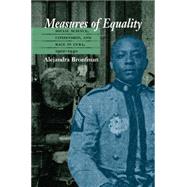
What is included with this book?
| Acknowledgments | xi | ||
| Introduction | 1 | (16) | |
| 1 Unsettled and Nomadic: Law, Anthropology, and Race | 17 | (20) | |
| 2 Social Science and the Negro Brujo | 37 | (30) | |
| 3 Barbarism and Its Discontents | 67 | (20) | |
| 4 Contested Histories: Public Memory and Collective Identities | 87 | (20) | |
| 5 Social Science, State-Making, and the Politics of Time | 107 | (28) | |
| 6 The Politics of Blackness on the Eve of Revolution | 135 | (24) | |
| 7 From Comparsas to Constitutions | 159 | (24) | |
| Epilogue | 183 | (4) | |
| Notes | 187 | (20) | |
| Bibliography | 207 | (22) | |
| Index | 229 |
The New copy of this book will include any supplemental materials advertised. Please check the title of the book to determine if it should include any access cards, study guides, lab manuals, CDs, etc.
The Used, Rental and eBook copies of this book are not guaranteed to include any supplemental materials. Typically, only the book itself is included. This is true even if the title states it includes any access cards, study guides, lab manuals, CDs, etc.